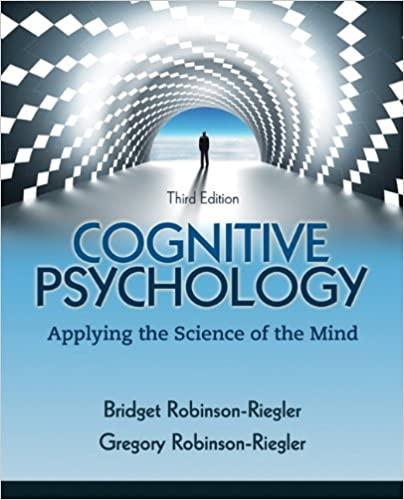Question
Sheng is coming into therapy for the first time and is very nervous about receiving therapy services. During session she is trying to determine if
Sheng is coming into therapy for the first time and is very nervous about receiving therapy services. During session she is trying to determine if therapy is something she wants to pursue to help her work through her struggle with depression. The therapist will try to help Sheng understand the benefits of therapy and help her reflect on her struggle with depression and support her in making the decision for future services. Sheng is a 30 year old Hmong woman who lives in St. Paul, Minnesota with her parents and her 2 young children. After she and her husband divorced 3 years ago she became very depressed. She was recently hospitalized for suicidal ideations and was diagnosed with Major Depression. After her stay in the hospital she was referred to Adult mental health case management services and they suggest that she obtain individual therapy. Sheng comes from a very traditional family where her parents want her to seek a shaman healer to help her work through her issues instead of going to therapy. However, she does not feel comfortable with that approach and agreed to try therapy first. Sheng is very nervous about attending therapy due to the fact that she's afraid others will judge her and call her "crazy."
1. Based on the case, what does the client identify as her primary concerns?
2. Based on this case, what are personal factors that are strengths or resources that assists with client functioning? What, if any, are personal factors that are deficits, obstacles, or challenges to client functioning? 3. Based on this case, what are environmental factors that are strengths/ resources and deficits, obstacles, or challenges to client functioning? Identify cultural factors that are strengths and/or barriers to Sheng's desire to seek assistance with the identified problem.
4. Using the following grid and the case above, complete an assessment of Sheng's problems and strengths.
Multidimensional Assessment - Biological (i.e. race, gender, age, health, history of illness) - Psychological (i.e. DSM-V criteria for depression (Symptoms, duration of symptoms, severity of symptoms), cognition, thought processes) - Social (i.e. family of origin, nuclear family, friends, supportive persons) - Cultural (i.e. cultural factors, acculturation, interactions with dominant culture, family culture, peer culture etc) - Spiritual (i.e. religious practices that impact her identified problem)
Other Systems - Legal System (are there legal factors impacting Sheng's functioning?) - School System (i.e. Is Sheng in school and how does that impact her functioning, or how is her mental health impacting her ability to function in school? Does her children's schooling impact her as she interacts with school staff?) - Employment (i.e. How is Sheng's employment affected by her mental status? Does her employment impact her mental status?)
Step by Step Solution
There are 3 Steps involved in it
Step: 1

Get Instant Access to Expert-Tailored Solutions
See step-by-step solutions with expert insights and AI powered tools for academic success
Step: 2

Step: 3

Ace Your Homework with AI
Get the answers you need in no time with our AI-driven, step-by-step assistance
Get Started


